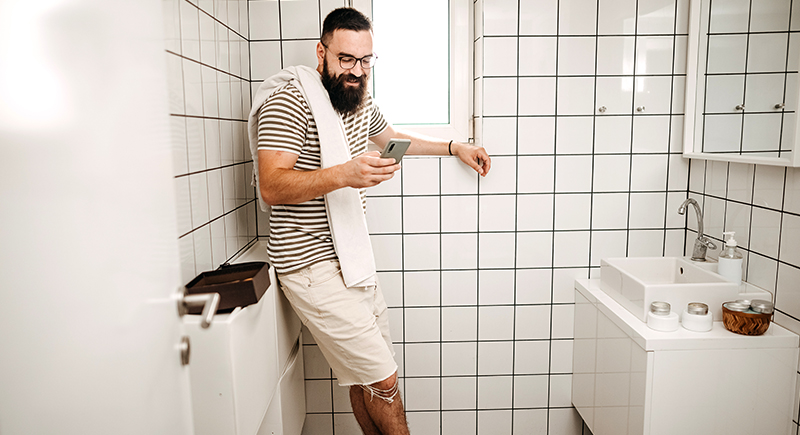These 14 Phone Habits Could Be Relationship Deal-Breakers
Smartphones are stitched into nearly every part of modern life—from morning alarms to late-night texts. But for all the convenience they offer, they can quietly chip away at the health of a relationship if we’re not paying attention. It’s not the devices themselves that cause trouble—it’s how we use them. Constant scrolling during dinner, checking messages in the middle of a conversation, or even those seemingly harmless “likes” can all send subtle signals that your partner isn’t your priority. These are the habits worth watching if you want to keep trust, communication, and closeness intact.
Not Sharing Passwords

Credit: iStockphoto
When someone flat-out refuses to share their phone password—especially after years together—it can feel less like privacy and more like secrecy. Sure, everyone’s entitled to some digital space, but a total lockdown might raise an eyebrow or two.
Hiding Their Phone

Credit: iStockphoto
Shoving a phone into a pocket the moment you walk in is suspicious. If it happens repeatedly, it starts to feel less like coincidence and more like strategy. Most people don’t suddenly get shy with their screens unless they’ve got something to tuck away—like a surprise birthday text or, well… not that. Context matters, but habits like this can chip away at comfort.
Keeping Phone Face Down

Credit: iStockphoto
Phones face-down on tables aren’t always shady, but when it’s constant, you start to wonder. It’s like the digital version of whispering at a party. It’s less about what’s happening on the screen and more about why they don’t want you to see it.
Turning Body or Phone Away from You When They’re On It

Credit: iStockphoto
There’s a big difference between finding a comfy position and angling your phone like it’s the launch code to something classified. When someone consistently turns away while texting or scrolling, it can start to feel like a barrier. If you’re close enough to share dinner plates, why not screen space? Even a little openness goes a long way.
Closing Apps or Locking Phone When You Approach Them

Credit: iStockphoto
That rapid swipe-up, then power button tap when you enter the room, isn’t subtle. Unless they’re planning a surprise party or managing top-secret birthday plans, locking things up the second you appear could signal some digital dodging. The human brain is wired to pick up on small behavioral changes—especially ones that hint at secrecy—and this one gets noticed.
New Password Change

Credit: iStockphoto
Sudden password changes are like mid-season plot twists—unexpected and somewhat suspicious. If there’s no clear reason (lost phone, security breach), changing a passcode without explanation might set off internal alarms.
Hot and Cold About You Touching Their Phone

Credit: iStockphoto
One day, they’re tossing you their phone to check the GPS, and the next day, they act like it’s radioactive. That inconsistency can feel unsettling. Phones are personal, sure, but flipping from casual to “hands off” without reason makes the vibe weird. If nothing changed, what changed? Mixed signals and phones don’t go well together—and partners can always tell when the energy shifts.
Gets Angry or Defensive When Approached About Their Behavior

Credit: iStockphoto
Asking about phone behavior and getting a “Why are you so paranoid?” response is like being served attitude with a side of avoidance. Defensive reactions usually show up when someone feels cornered—or guilty. According to therapists, defensiveness is a major roadblock in communication. Calm curiosity should be met with calm answers, not a dramatic episode over screen time.
Phubbing (Phone Snubbing)

Credit: iStockphoto
Yes, this has a name—phubbing. It’s when someone ignores you in favor of their phone, and it’s surprisingly common. Nobody likes playing second fiddle to Reddit threads or fantasy leagues. It’s a buzzkill if someone’s always buried in a screen while you’re talking.
Excessive Texting During Shared Time

Credit: iStockphoto
Texting in the middle of dinner, date night, or a serious conversation rarely works, and if it’s constant, it becomes annoying. Even brain scans show that divided attention reduces connection in face-to-face interactions. Being present matters. If your partner’s thumbs are constantly tapping while you’re mid-story, it doesn’t scream, “I care about this moment,” it whispers, “I’ve got better things to do.”
Constantly Checking Notifications

Credit: iStockphoto
When someone’s phone pulls them away from every sentence you try to finish, it can start feeling like you’re competing with a slot machine. A study from Duke University showed that even the presence of a phone on the table can lower relationship quality. Constant checking doesn’t say “busy”—it says “distracted.” Beat the urge to respond to every ping and buzz.
Sleeping with the Phone Within Reach

Credit: iStockphoto
Keeping a phone on the nightstand isn’t unusual. But clutching it like a security blanket and checking it at 3 a.m. every night is a different story. Sleep researchers suggest turning off screens at least 30 minutes before bed for better rest and connection. The glow of the screen light shouldn’t be the third party if you’re sharing a bed with someone.
The “Ghost Notification” Habit

Credit: iStockphoto
You see them glance at the screen, unlock it, then quickly lock it again, like something urgent just happened. Except no sound ever went off. Repeated phantom checks can feel sneaky, even if nothing shady is going on. That constant half-attention sends a message that someone else might always be waiting.
Taking the Phone Everywhere (Even the Shower)

Credit: iStockphoto
Bringing a phone from the couch to the kitchen is normal. Taking it into the bathroom every time starts to feel different. When a device never leaves someone’s side, privacy can blur into secrecy. Partners may begin wondering why total separation from the screen suddenly feels impossible.